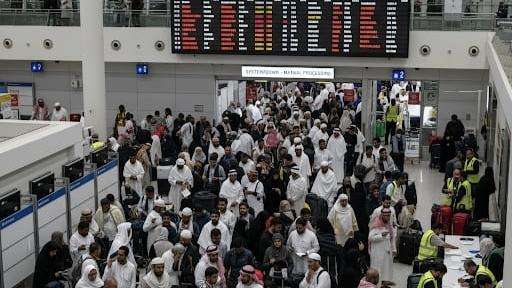The travel chaos sparked by a suspected cyber attack on London Heathrow Airport is continuing into a third day, with thousands of Umrah pilgrims among the most severely affected. As of Monday at 11 am, flights remain delayed and passengers are enduring hours-long queues, with electronic check-in systems still largely inoperable.
The disruption began on Friday night after a "technical issue" hit the electronic check-in and boarding systems provided by Collins Aerospace, a major software vendor. The company has since acknowledged a "cyber-related disruption" to its MUSE software, which allows multiple airlines to share airport infrastructure. With the automated systems down, airport staff have been forced to process passengers manually with pen and paper, leading to significant delays and cancellations at Heathrow, as well as at other major European hubs like Brussels and Berlin.
For Umrah pilgrims, many of whom are traveling in large groups and on strict schedules, the situation has been particularly distressing. Reports from Terminal 4, a major hub for flights to the Middle East, describe scenes of confusion and desperation. Pilgrims, some elderly and traveling with families, have been left waiting for hours with limited information, unable to check in or proceed to their gates. The spiritual significance of their journey, which requires a timely arrival for religious rituals, has been jeopardized by the ongoing technical failure.
While Heathrow has apologized for the delays and stated that "the vast majority of flights have continued to operate," the reality on the ground tells a different story for many. Flight tracking data from the weekend showed dozens of cancellations and hundreds of delays. On Monday morning, planes bound for a number of destinations, including those serving pilgrimage routes, are still showing as delayed.
The UK's National Cyber Security Centre (NCSC) is working with Collins Aerospace and affected airports to understand the full scope of the incident. While officials have not publicly named a perpetrator, politicians and aviation experts are already speculating about the involvement of state-backed actors, with some pointing a finger at the Kremlin. The incident serves as a stark reminder of the vulnerability of global travel infrastructure to sophisticated cyber attacks. As the system remains offline, thousands of pilgrims are left to pray for a swift resolution, hoping their sacred journey is not lost to a digital breach.








.svg)

_5.jpg)
